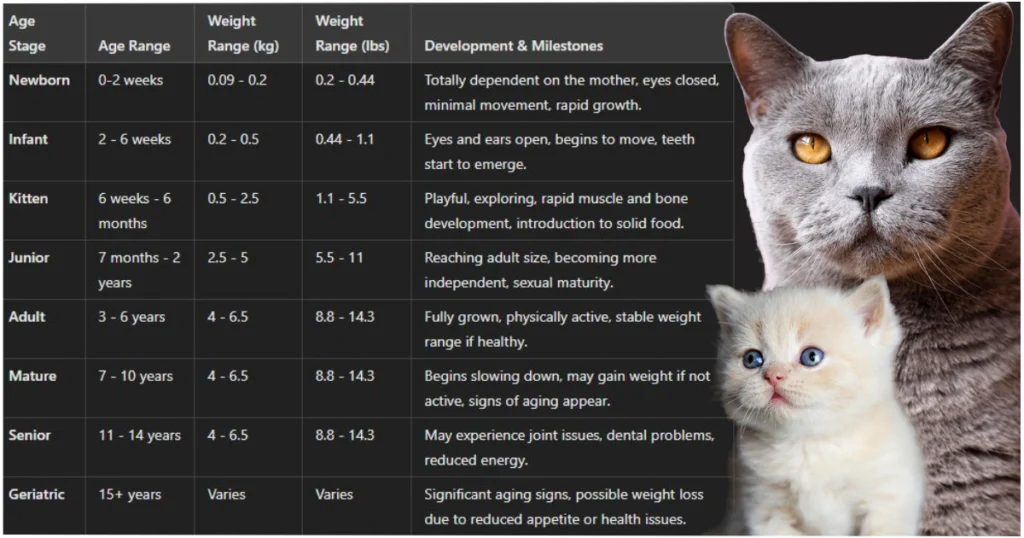Ever wondered about the average weight of a cat and what’s healthy for them? This guide has all the answers. It’s packed with tips to keep your cat happy and healthy.
Knowing your cat’s ideal weight is key to their health. It matters whether your cat is a kitten, an adult, or a senior. Knowing the right weight range helps you spot health problems early. This way, you can keep your cat in top shape and avoid future health issues.
Understanding the Importance of a Cat’s Weight
Keeping your cat at a healthy weight is key for their wellbeing. Cats that are too heavy or too light can face serious health problems. These issues can greatly affect their life quality and how long they live. It’s important to know the healthy cat weight range to keep your cat happy and healthy for a long time.
Maintaining a Healthy Weight for Feline Wellbeing
A healthy cat weight lets your pet move easily, play a lot, and live without pain. Cats at a good weight are less likely to get joint problems, diabetes, and other weight-related issues. By watching your cat’s weight and adjusting their diet and exercise, you help them stay healthy.
Potential Health Issues Related to Weight Imbalances
- Underweight cat health problems include weak immune systems, organ issues, and being more likely to get sick or hurt.
- Cat obesity risks include joint pain, diabetes, heart disease, and even some cancers, all of which can really hurt your cat’s life quality.
It’s crucial to keep your cat at a healthy weight for their long-term health and happiness. By understanding the importance of cat weight and taking steps to keep it right, you can make sure your cat has a happy, active life.
Average Weight of a Cat: A Comprehensive Overview
Cats come in many shapes and sizes. Knowing the average weight of domestic cats helps ensure your cat stays healthy. Whether you have a sleek Siamese or a fluffy Maine Coon, understanding typical weights for different breeds and ages is key.
The average domestic cat weighs between 8 to 10 pounds. But, this can change based on the breed. Siamese cats usually weigh 5 to 10 pounds, while Maine Coons can be 9 to 18 pounds. As cats age, their weight can also change a lot. Kittens weigh less than 5 pounds, and senior cats can reach 15 pounds or more.
| Cat Breed | Average Weight Range (lbs) |
|---|---|
| Siamese | 5 – 10 |
| Maine Coon | 9 – 18 |
| Persian | 7 – 12 |
| British Shorthair | 7 – 17 |
| Ragdoll | 10 – 20 |
Remember, these are just general guidelines. A cat’s weight can be affected by many things, like how active they are, their health, and their metabolism. Regular vet visits are crucial to keep your cat’s weight healthy and catch any health problems early.
“A cat’s weight is a crucial indicator of their overall health and well-being. Keeping a close eye on your feline friend’s weight can help you make informed decisions about their care and ensure they live a long, happy life.”
Factors Influencing a Cat’s Weight
Keeping your cat at a healthy weight is key. But, many things can affect a cat’s weight. Age, breed, diet, and exercise all play a part. Knowing these can help you care for your cat better.
Age and Breed Considerations
Kittens are usually more active and weigh less than adult cats. As cats get older, they might move less and gain weight if they don’t change their diet or exercise.
Also, different breeds have different weights. For example, Maine Coons are big, while Siamese cats are smaller. Knowing your cat’s breed can help you see if they’re at a healthy weight.
Diet and Exercise Habits
What your cat eats and how much they move affects their weight. Eating the right food and staying active helps them stay healthy and at a good weight. Things like high-quality cat food and playtime are important.
| Factors | Impact on Cat Weight |
|---|---|
| Age | Kittens tend to be more active and have higher metabolisms, while senior cats may experience weight gain due to decreased activity levels. |
| Breed | Different cat breeds have varying weight ranges, with some, like Maine Coons, being larger in size, and others, like Siamese, being more petite. |
| Diet | A balanced, portion-controlled diet with high-quality cat food can help maintain a healthy weight. |
| Exercise | Regular physical activity, such as active playtime, can contribute to a cat’s overall wellbeing and weight management. |
Understanding the factors affecting cat weight helps you keep your cat healthy. This includes knowing about cat breed weight differences and how diet and exercise impact cat weight. This way, you can help your cat stay at a healthy weight all their life.
Assessing Your Cat’s Weight at Home
Keeping your cat at a healthy weight is key for their health. Knowing if your cat is too heavy or too light can help you change their diet and lifestyle. This guide will show you how to check your cat’s weight at home. It will help you see if they are at a good weight or if they need help.
Visual Indicators of a Healthy Weight
You can check your cat’s weight by looking at them. Here are important signs to look for:
- Ribs and Spine Visibility: You should feel your cat’s ribs and spine, but they shouldn’t be too easy to see. If you can see them too much, your cat might be too thin.
- Waistline: A healthy cat should have a waistline that looks a bit smaller when viewed from above. If their waistline is not there or looks too big, they might be too heavy.
- Abdominal Tuck: Healthy cats should have a slight curve in their belly when seen from the side. If their belly looks round or sticks out too much, they might be too heavy.
| Weight Indicator | Healthy | Overweight | Underweight |
|---|---|---|---|
| Ribs and Spine Visibility | Felt, not visible | Not visible | Prominently visible |
| Waistline | Slightly tapered | Non-existent or bulging | Visible waistline |
| Abdominal Tuck | Slight tuck | Rounded or protruding | Pronounced tuck |
By watching these signs closely, you can tell if your cat is at a healthy weight. If you’re worried, it’s best to talk to your vet. They can give a professional opinion and advice.
Conclusion
Knowing the average weight of a cat is key for their health and happiness. Factors like age, breed, diet, and exercise play a big role. Keeping your cat in top shape is important for their well-being.
Checking your cat’s weight regularly is crucial. It helps spot any weight issues early. Keeping your cat at a healthy weight prevents obesity and other health problems. This way, they can enjoy a long, active life.
Every cat is different, and their ideal weight can vary. Always talk to your vet to find the right weight for your cat. By focusing on your cat’s health, you’ll have a happy, loyal pet for many years.
FAQ
What is the average weight of a cat?
The weight of a cat can change based on breed, age, and gender. Most domestic cats weigh between 8 to 10 pounds. Males usually weigh a bit more than females.
How can I tell if my cat is at a healthy weight?
To check your cat’s weight, look at them and feel their body. A healthy cat should have a clear waist. Their ribs and spine should be easy to feel but not too visible.
Too much fat or bones that stick out can mean they’re not at a good weight.
What are the potential health issues associated with an imbalanced cat weight?
Being too heavy or too light can cause health problems in cats. These include joint pain, diabetes, liver disease, and breathing issues. Keeping your cat at the right weight is important for their health and life span.
How can I help my cat maintain a healthy weight?
To help your cat stay healthy, feed them a balanced diet and make sure they exercise. Talk to your vet to find out how much food and exercise they need. Adjust their routine as needed to keep them healthy.
Are there any breed-specific weight considerations I should be aware of?
Yes, some cat breeds naturally weigh more or less than others. For example, Maine Coons are often bigger, while Siamese cats are smaller. Knowing the typical weight for your cat’s breed helps you see if they’re healthy.


Thank you for your articles. They are very helpful to me. May I ask you a question?
Please tell me more about this. May I ask you a question?